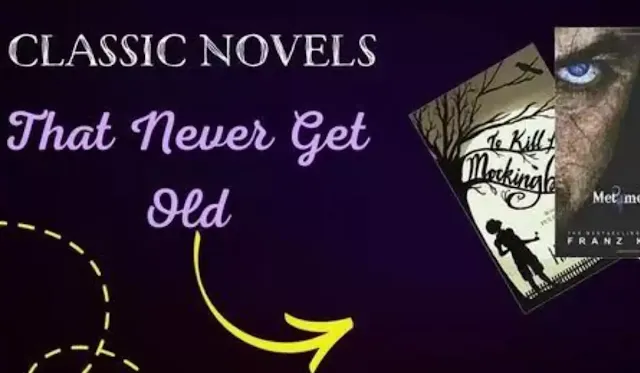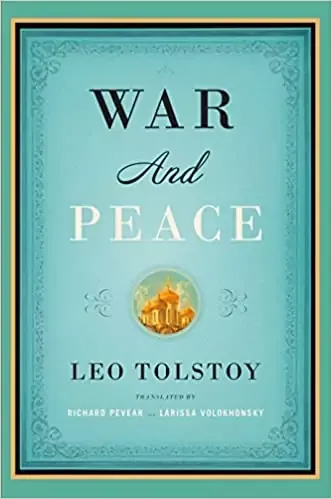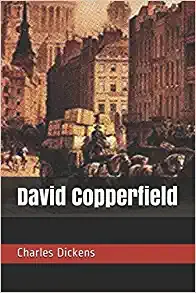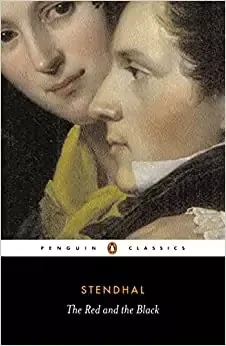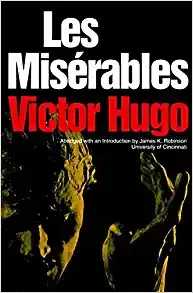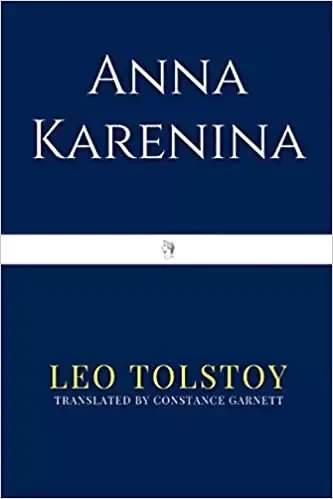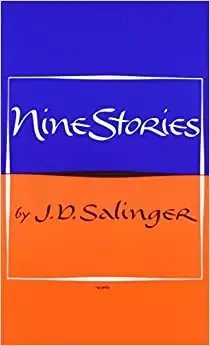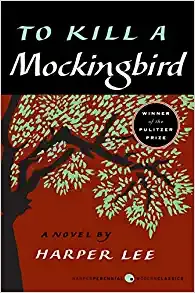It is the masterpiece of the famous British realist female novelist Austen. Her works are narrow in subject matter, basically describing the love stories of the class she lives in.
However, she observes carefully and writes delicately, vividly, and profoundly describing many aspects of life in that era, with a distinct epochal character.
11. Rashomon and Seventeen Other Stories
Rashomon and Seventeen Other Stories by Ryunosuke Akutagawa
The book "Rashomon" can be said to be the author's representative work. The author created the whole book in a romantic style. The storyline created by the author is very novel and wonderful.
The author is particularly good at using simple words to show us the ugly phenomenon in society. It is the author's precise vision of society that makes readers like Akutagawa Ryunosuke's works very much. The book "Rashomon" contains 13 excellent short stories.
This book conveys to us the author's understanding of people and his helplessness in life. After reading this book, you will have endless aftertastes. I think this book Books can be read over and over again to find your true self.
12. Nine Stories
Nine Stories by J. D. Salinger
The book "Nine Stories" is the author's representative work. The book created by Salinger has no specific background, but the story of the book is very exciting. The story structure of the book is completed by the dialogue between the two people.
After reading this book, it will convey to you how to do things better. There are 9 articles in this book, each of which tells us that even the people closest to you know nothing about you, so don't lose hope in life. The author believes that the world of children is the real world, and the world of adults is something the author does not want to mention.
He thinks that the world of adults is like a humble and terrible world. This book makes us think about our own lives through the characterization and description of 9 stories. I think this book is worth collecting. After reading it, you will have endless aftertastes and find your true self.
13. Cathedral
Cathedral by Raymond Carver
The book "Cathedral" mainly describes the attitude of the common people towards life. The anger and deterioration of the common people's life, it show us that the common people have to get up again after the suppression of life. They are silent and peaceful towards life. Lonely.
The book earned a Pulitzer nomination for its accurate portrayal of civilians. This book depicts many stories of civilian life. Although they are suppressed by life, they will not be defeated, and civilians will only become stronger in the face of life.
This book makes us start to think about our own lives through the description of civilians. We should have a strong heart to struggle with life. This book is worth reading again and again. After reading it, it was very memorable, and I found my true self.
14. The Outsider
The Outsider by Albert Camus
The full text of this novel by Camus is about 100,000 words and can be read in a day. More than seventy years after the original edition, this book is still timeless.
In every advancing era, there will be social impetuousness, and every seemingly quiet person has the shackles that they want to break free of. Just like the title of this book, break free from social standards and become an outsider. So this book is enduring.
Camus' writing and narration are inherently sharp, and there are also many classic views and golden sentences in the book, which are worth reading many times.
15. The Moon and Sixpence
The Moon and Sixpence by W. Somerset Maugham
There is a vague sense of similarity with "The Outsider". The protagonist abandons his social identity and resolutely follows his soul on the thorny artistic path. He was tortured by the longings of the soul during his lifetime, and his fame after death had nothing to do with him.
Even though the book has been on the bestseller lists for centuries, it has had mixed reviews. A lot of people don't understand what the protagonist does and don't like the way Maugham writes. Reading this book is like asking your soul: Are you willing to give up everything for your dreams? everything.
16. One Hundred Years of Solitude
One Hundred Years of Solitude by Gabriel Garcia Marquez
A magical story, of a simple family willing to explore, exiled to the outside world, and enduring the mental torture brought by time and space along the way. The ups and downs of several generations are reflected in the development of human beings and looking at the struggles of individual human beings, loneliness is everywhere.
This book is very unfriendly to readers who don't read a lot. It's not that it contains a lot of knowledge, but one-third of the book's content is almost boring. What can be clearly perceived is Professor Fan Ye's vigorous translation. As the editor said, this book is also a glass of strong stamina.
17. Little Women

Little Women by Louisa May Alcott
The book Little Women was a book that had a huge impact on my life. Until now, I will recommend this book to little girls, it can be said to be a must-read classic for girls. I started reading this book when I was in elementary school. In the long time that followed, I read it countless times, and in the late nights of disappointment, depression, and insomnia, rereading this book, I felt that life is very beautiful, and everything is possible.
Until now, those sentences in the book can be twisted at will:
the wise thing to do is to be prepared so that when the moment of happiness comes, you will feel ready to take responsibility and worthy of that happiness.
"Well said, Jo, I'd rather be a happy old maid than a sad wife or a rambunctious girl, running around looking for a husband,"
Laurie lay on the rug, pretending to rest, staring at Huo Miao thought about his thoughts, and his thoughtful expression made his dark eyes appear clear and tender, and very beautiful. (By the way, I really like Laurie)
I lost sleep last night and read half of it in the early hours of the morning. In those years, the simple and simple outlook on life in the book still warms me. But I still don't dare to watch the ending. For so many years, I hated that ending so much that I was only willing to read half of it when I reread it.
18. Tess of the D'Urbervilles
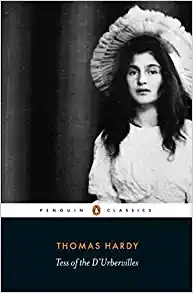
Tess of the D'Urbervilles by Thomas Hardy
After listening to the teacher's suggestion, he read this book. He said in class that he had a daughter and would often let her read it. In fact, the book contained an outlook on life, values, and love. Read Pride and Prejudice when you don't know what to choose, Jane Eyre when you're uncertain about love, and Tess of the d'Urbervilles when you're lost in love. These books teach us to fall in love with a correct view of love, to respect ourselves, and to love ourselves.
After reading this book, I can't help but sigh, if I don't have a correct view of love, what will be the consequences? I often hear that today's girls are crazy about love, commit suicide by jumping off a building, and don't cherish life. It's a pity to think about it. In fact, the same is true for the heroine in this book. In this tragic fate, she, like a reed, cannot protect herself and is bullied and hurt. The author emphasizes fatalism.
The book has a subtitle: A Pure Woman There is always a lot of talk about whether Tess is a pure woman. I think she is a pure woman, not physically, but spiritually. She's loyal to Angel, she's sincere, loves him the best she can, and she's honest enough to face up to her tragic past.
This book is Hardy's most famous work, and seeing the tragic life experiences of the heroine, I wonder, whose fault is this, that Tess was blinded by hate? Is it Alec's fault? Or was Angie unreasonable with his wife? In fact, in love, no one is right or wrong, how much you pay, there may not be an equal return. Some people are unlovable, and some people are shaken by the eyes of the world.
A pure girl is destroyed by two men who symbolize the power of destruction, and Tess's misfortune provokes accusations against society. At the end of the story, the author sarcastically wrote: "...justice, served, the Immortal President ended his game with Tess.
19. I Capture the Castle
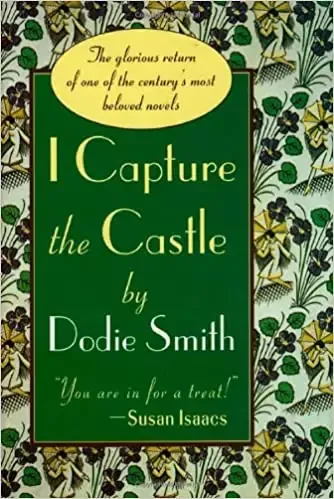
I Capture the Castle by Dodie Smith
I have a soft spot for British "castle (manor)" literature, from Jane Austen's "Mansfield Manor" to Emily Bronte's "Wuthering Heights", to Sarah Waugh Tess's "City of Thorns", British female writers showed infinite nostalgia for the ruined city, the gray brick walls, the deteriorating aristocratic life, and the emotional secrets hidden inside, as if they were the ones who wrote the castle story. The supreme patent, only they can write well, these castles (manor) have become a bunch of wonderful flowers in British women's literature.
"I Capture the Castle" is Dodi Smith's debut novel, written in 1948. She is not only a household name in the UK but also a charismatic screenwriter in Hollywood, best known for Disney's 101 Dalmatians. Dodi grew up in a family full of theatrical atmosphere.
His grandfather loved Shakespeare's plays, his uncle was an actor, and his mother almost acted. She believes that the family environment is the driving force behind her work in theatre.
This book was listed on the BBC's "100 Britons' Favorite Books List" in 2003 and on the Guardian's "1,000 Must-Read Books in a Lifetime", which shows that this book has grown up with generations of British people. reading.
Compared with the above castle (manor) story, Dodi's "I Capture the Castle" is extraordinarily quiet, like a big boring movie. However, what I love is this "stuffy" feeling, which is enough to show the elegance of English literature, the whole novel is like a ripple on the surface of a tranquil lake, and reading is a secret pleasure.
"At this moment, I'm writing, and I'm sitting in the kitchen. It's like this: I have my feet in the pool and my body on the drip board." The novel begins with the narrative of seventeen-year-old Cassandra, who is writing Notes and dreams of becoming a writer.
20. Crime and Punishment
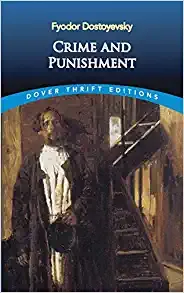
Crime and Punishment by Fyodor Dostoyevsky
How to write a book review for a famous book like "Crime and Punishment"? In Raskolnikov's bewildered, half-awake, uncontrollable wanderings, it's almost hard to realize that this is just a story that happened in a fortnight. Everyone has the instinct to commit crimes.
Can they convince themselves to complete the transformation of their identity just by being pushed by an unknowable force? How to define crime? In the matter of "claiming" the "right" to commit a crime, Raskolnikov also believes that "those who are capable are blessed".
There are too many scenes of almost religious fanaticism in this book: Ivanovna, who drives out his youngest son to perform on the street, vomits blood, and dies, and an innocent who turns himself in to the police.
Crime and Punishment is the story of a murder committed on principle, by a killer who wishes by his action to set himself outside and above society. A novel of fearful tension, physical, and psychological, it is pervaded by Dostoevsky's sinister evocation of St Petersburg, yet the life of its gloomy tenements and drink shops provides moments of wild humor.
Crime and Punishment were marked by Dostoevsky's own harrowing experiences. He had himself undergone interrogation and trial and was condemned to death, a sentence commuted to penal servitude.
In prison, he was particularly impressed by one hardened murderer who seemed to have attained a spiritual equilibrium beyond good and evil: yet witnessing the misery of other convicts also engendered in Dostoevsky a belief in the Christian idea of salvation through suffering.
21. The Secret Garden

The Secret Garden by Frances Hodgson Burnett
"There is a strange phenomenon of life in this world that there comes a time when a person suddenly believes that he will live forever, forever and ever. Or get up on a soft and solemn morning and be alone outside the house. Standing, looking up at the high blue sky, watching the gray sky slowly turn red, watching the beautiful rainbow change, until the sun rises magnificently in the east.
It happens to everyone. Or alone at sunset In the woods, the deep, mysterious, golden tranquility slanted down with the rays of sunshine through the branches, seems to be telling something inaudible, but still listening.
Or on a quiet and boundless night, the stars twinkling in the dark blue night sky, looking into the night sky, the stars will convince one to live forever.
Letting a sad or poisonous thought enter your mind is as dangerous as letting the scarlet fever germ enter your body. If you let this poisonous thought enter The mind just let it go, and you probably won't get rid of it in your lifetime." - "The Secret Garden" FH Burnett
It seems that I haven't come across such a delightful book in a long time. A good fairy tale should be written not only for children, but also for everyone, and to remove the dust from the hearts of those who read it.
Every word in the book is like the flowers and plants basking in the sun in the secret garden, or the heather, soft and warm. Mary and Kendi, and the little chief frolicking in the secret garden, reminded me of my childhood.
A Russian poet once said that you really grow up when you realize that a part of you remains forever in childhood.
Legend has it that everyone has a secret garden in their hearts. I don't think there should be dark, black, or evil there. Instead, plant a garden full of roses and ivy and gorse, where there is a place to rest, a thread of joy, where all happiness and beauty can be pulled out by pulling it, just as Mary finds it under the guidance of a robin The key to the secret garden.
22. Wuthering Heights

Wuthering Heights by Emily Brontë
When I read Wuthering Heights when I was a child, I only felt that the book was full of inexplicable and vicious people, and the reading experience was extremely uncomfortable.
Now that I have grown up, I can see the inextinguishable love and hate in it. Just like Maugham said, this book is very It's not perfect, but it has what few novelists can give you, which is power.
Also remembered what Janet Winterson said, "I long for someone to love me violently until death, to know that love is as strong as death, and to sustain me forever. I long for someone to destroy me and be destroyed by me."
The charm of Wuthering Heights is incomprehensible, it is rough but strong, very strong and deadly, and everything goes to the extreme. Heathcliff should be a diabolical male protagonist, and this time I can't accept him at times, but, like Katherine, he can't be understood but felt.
All the love that happens at Wuthering Heights is overwhelming, for no reason, just like that, and there's almost nothing to say about it, how true it is. I am also inclined towards Woolf's theory of genius because Emily must have never tasted true love to create such a passionate love that is more tenacious than vitality in her lonely imagination.
Can there be such love? This kind of love is not eroded by life and is homogenous to the soul. For this unprovable lie, I forgive Heathcliff and Catherine for their bad temper. Others have been reduced to supporting roles in front of them. "Even if you keep falling in love for eighty years, it is not as good as my love in one day."
23. Anne of Green Gables
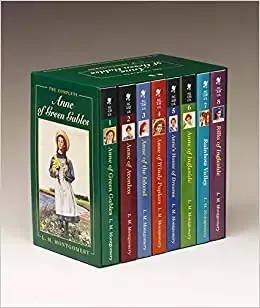
Anne of Green Gables by L. M. Montgomery
This is a very beautiful children's literature about youth growth. After reading this book, I really wanted to become a girl like Annie. I did it for a long time, but my nature was hard to change, so I had to finish this book.
There are four books, including "Anne of Green Gables", "The Girl Anne", "Anne of the College Girl", and "Anne of the Poplar in the Wind", all of which are very good-looking. I heard that the author wrote about Annie's whole life.
Recommended reason: This book is really strong, it actually created a world tourist attraction!
24. The Lord of the Rings

The Lord of the Rings by JRR Tolkien
I didn't choose this title to be scary or to gain clicks, I'm telling the truth.
After Tolkien's sudden inspiration, in the midst of the smoke of war, Tolkien finally wrote this magnificent novel. Maybe I'm a little sorry for his old man by saying that, but I still hope you stop reading books and just watch movies.
Tolkien sold it without hesitation when the studio bought him the right to remake the movie because he didn't think "The Lord of the Rings" could be made into a movie. But today, 50 years later, "nothing is impossible" is hanging all over the street. So Peter Jackson did it, and he didn't mean to insult "The Lord of the Rings."
Even though the original book is very long, he insisted on completing the "trilogy" in twelve hours that can sit on a person's ass. The Elf Prince is very handsome, so the director hired Orlando Bloom; the Hobbit was short, so the director used special effects... I have said so many things that seem off-topic, but I just want you to give up watching The Lord of the Rings.
Don't want to hear someone say "The Lord of the Rings" novels are boring, boring, and cumbersome. Even more unwilling to search for reasons to quell your disappointment.
I also don't know why I was able to spend the time on the bus reading novels, thinking "It seems a little boring" and turning to the next page. On the way home from the library, I heard my classmates ask me, "Is "The Lord of the Rings" good? You look very interesting from the look on your face."
You won't see handsome guys and beauties in the book. A long line of neatly arranged but inaudible poems; there are no brilliant illustrations in the book for your reference, you are alone in your imagination. I don't have much to say about novels. I'm just amazed that the author has such a magical and magnificent world in his head, his imagination is meticulous and interlocking.
It's hard to believe that a historian can still have such a wild imagination. Poetry is everywhere in the novel, certainly not comparable to Dante's Divine Comedy. But I think Tolkien must be a particularly literate writer. If there's one movie that can't match it, it's the inability to fully express these beautiful words.
In the long river, many things are carried. So it's no wonder that so many things are ignored. I can't guarantee whether the "Lord of the Rings" novels can be worthy of the word "classic". Usually, the ones that are worthy of the word "classic" are those that are far from "popular".
The novel seemed to be further buried in the movie when it became a big hit. I also do understand that reading a book takes more than four hours. In the modern fast-paced society, these hours of reading such a long work are true "out of place".
But remember, The Lord of the Rings is far better than you might think.
25. The Wind in the Willows
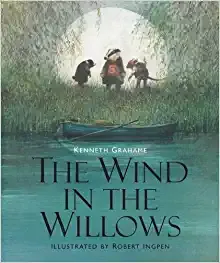
The Wind in the Willows by Kenneth Grahame
The Wind in the Willows is the representative work of the British writer Kenneth Graham (1859-1932), based on the story he told to his son who was born with eye disease. Since its publication in 1908, The Wind in the Willows has been loved by generations of readers and is a well-deserved British literary classic and a treasure of children's literature.
As a typical Victorian children's literature, The Wind in the Willows is an anthropomorphized novel. After reading this book, you feel you'd better surround yourself with friends like this: a fanciful playmate like the Water Rat, a loyal friend who can be around you whenever you need help like the Mole; and an avuncular tutor who can give you useful advice when needed like the Badger; of course, a mischievous friend like the Toad whom you hate and love but you will never desert.
A bedtime story turns into a masterpiece that never loses appeal to young and adult readers for generations and most likely generations to come. Some plots, e.g. the Rat, after hearing their stories, in a whimsical instant, decides to (but fails only by the interruption of his friend the Mole) follow the swallows to fly the yearly journey to the south, really take my breath away and can't stop fancying to set lose a long-locked wayfare!
This book is a testimony to the deep father's love, and a beautiful fairy tale about home, allowing the mind to be free in endless fantasies. Graham's writing is demure, elegant, and a model of perfect prose.
For more than a hundred years, many famous artists have illustrated this work, and the version dedicated by EH Shepard (1879-1976) is one of the most acclaimed. Few have captured the unadulterated joy of the world of the Willows better than Shepard; as it has been said, "their words and paintings are green and gold, like recalling summer in autumn good".
26. The Catcher in the Rye
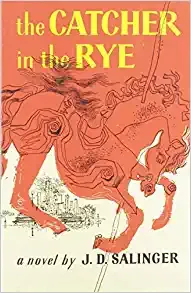
The Catcher in the Rye by J. D. Salinger
The hero-narrator of The Catcher in the Rye is an ancient child of sixteen, a native New Yorker named Holden Caulfield. Through circumstances that tend to preclude adult, secondhand description, he leaves his prep school in Pennsylvania and goes underground in New York City for three days.
The boy himself is at once too simple and too complex for us to make any final comment about him or his story. Perhaps the safest thing we can say about Holden is that he was born in the world not just strongly attracted to beauty but, almost, hopelessly impaled on it.
There are many voices in this novel: children's voices, adult voices, underground voices-but Holden's voice is the most eloquent of all. Transcending his own vernacular, yet remaining marvelously faithful to it, he issues a perfectly articulated cry of mixed pain and pleasure.
However, like most lovers and clowns and poets of the higher orders, he keeps most of the pain to, and for, himself. The pleasure he gives away, or sets aside, with all his heart. It is there for the reader who can handle it to keep.
JD Salinger's classic novel teenage angst and Rebellion was first published in 1951. The novel was included on Time's 2005 list of the 100 best English-language novels written since 1923.
It was named by Modern Library and its readers as one of the 100 best English-language novels of the 20th century. It has been frequently challenged in court for its liberal use of profanity and portrayal of sexuality and in the 1950s and 60's it was the novel that every teenage boy wanted to read.
27. Invisible Man
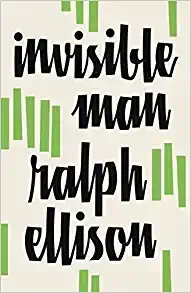
Invisible Man by Ralph Ellison
This is another highly influential work of black literature after Wright's native son. The author Allison followed Wright in his early years and engaged in literary creation under Wright's guidance. After that, the two had disagreements on racial issues and parted ways. Wright advocated against whites and hated whites, while Allison emphasized that blacks should be patient and self-improved. Both ideas are one-sided.
The Invisible Man was published in '52 and won the American Book Award in '53, but the critics apparently thought he was not very combative and gave the native son a higher evaluation. But I feel like the unseen seems to be getting more and more value over time.
The protagonist doesn't have a name, and the author deliberately doesn't show his name in the book, he used to be a refined individualist, obedient to white people, and strives to get ahead by his own efforts, I find it strange to read the comments, they really saw this works?
Obviously, there is still a lot of resistance in the protagonist, and every time he is cornered, he always fights back hard. The comment said that he looked down on the black landlord's aunt, I really didn't see it, to support the native child, it would not be so hard to attack this book.
This book is more like a history of personal struggles, full of helplessness, racial discrimination, and surging trade union movements in society at that time. All kinds of characters are very successful, especially the fraternity. The author did not deliberately beautify them.
28. To Kill a Mockingbird
To Kill a Mockingbird by Harper Lee
I want to chat with you about my thoughts on the book To Kill a Mockingbird, which you can read when you have time.
I still sigh that there are not so many adventures in my childhood, which makes me realize that the shallowness of my past cannot be concealed by age, but I have to admit that even after reading this book, I have benefited a lot.
Fragments of the book seem to have strong contemporary contexts, the kind you can spot when you read them: racial sectarianism, Hitler, and Dewey's education laws, for example.
However, I don't think this background can limit the eternal theme (which is rare) - that all men are created equal. There are indeed many inequalities in the story, unequal skin color, unequal family members, and even inequalities between beliefs.
The article does not talk much about Atticus' religious beliefs, but I think he is more Christian than most people who believe in Christ. The believer has a higher morality - he loves people so much that it extends to all things. He uses his own special way to show respect for everyone, and he is also showing what a real gentleman does.
He is neither submissive nor harsh. He is gentle but not rude, and his behavior is powerful but not rude. I think This is the best education for his children. Remember?
At the end: "Scooter, when you finally get to know them, you will find that most people are good people." I think this is what this novel wants to express most, which is really pure universal values.
29. Emma
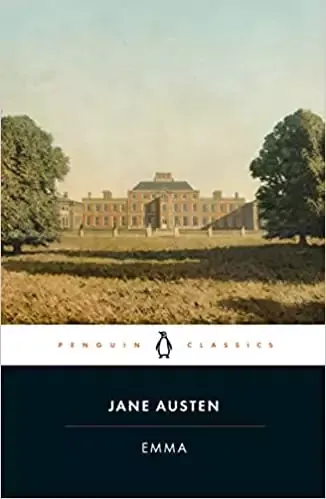
Emma by Jane Austen
Anyone who has read Austen's novels knows: that walks, conversations, dances, and letters... are the plots of Austen novels. Love, marriage, family property, and family... are the themes of Austen's novels. These things are enough to fill her six novels.
No wonder Charlotte Bronte says that Austin doesn't know what passion is. But it is undeniable that in those walks, dances..., family, and marriages..., there are really few people who can write better than her so when Austin is mentioned, everyone will immediately think of these scenes.
If you calm down and read carefully, you will find that there are ingenious misunderstandings and subtle suspense in those bland scenes. When the misunderstanding is eliminated and the suspense is solved, it will also make people smile. It is small and has limited depth, but it can also lead to a secluded, different world. As for the great rivers, mountains, and plains, it is naturally impossible to find them.
This was not in the writer's scope of consideration. Disappointed readers can only blame themselves for finding the wrong place. Therefore, Austin is a writer who can only control the subject that he can control, and control very well.
At the same time, Austin is a purely female writer. Like Zhang Ailing, she opened any of their novels, and no one would doubt that it was not written by a female writer. It's just that Eileen Chang has a sad and decadent tone, while Austen's writing is bright and warm.
Charlotte is actually a very feminine writer, but it's her sister Emily's writing that makes her androgynous. In "Wuthering Heights", the fierce determination of emotion does not allow many male writers. I was fortunate enough to read Wuthering Heights when I first entered the hall of Western literary classics, and the wonderful impression it left on me has inspired me to travel in this hall.
30. A Tale of Two Cities by Charles Dickens
Since its publication, A Tale of Two Cities has been well received by readers, comparable to David Copperfield. The "Twin Cities" in A Tale of Two Cities refers to Paris and London.
The honest and kind doctor Manette was thrown into the Bastille for reporting the evil deeds of the nobles. His orphan Lucy was brought up by his friend Lowry in London.
The aristocratic young Darney hates the crimes of his family, so he gives up the family property and becomes a French teacher in London, where he develops sincere feelings for Lucy.
Manet has been released at this time, and he readily agrees to their marriage with a generous heart, but Darnay is constantly framed by Madame Defarge who comes from the bottom and has great hatred for the nobles.
Caton, who had always admired Lucy, voluntarily replaced Darne on the guillotine, and Lucy and Darne went away.
Conclusion of Best Classic Books of All Time
Reading books can improve our literacy. Books are like our friends. When we encounter things that we can't handle or don't know the answer to, we can find what we want from books.
Reading classic books allows you to collide with the author's mind, and then think and find your true self.
The above 30 best classic books of all time are the ones I share. After reading them, you will have endless aftertastes that are worth reading again and again.

